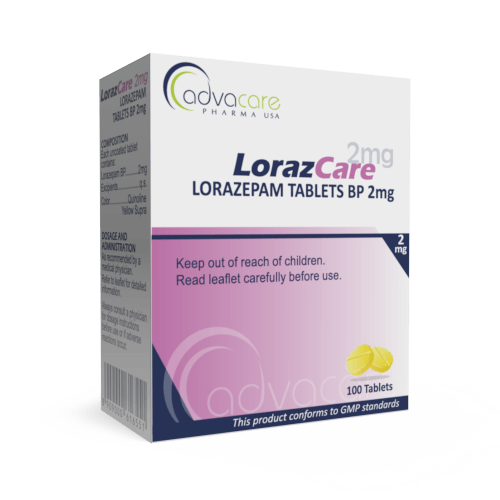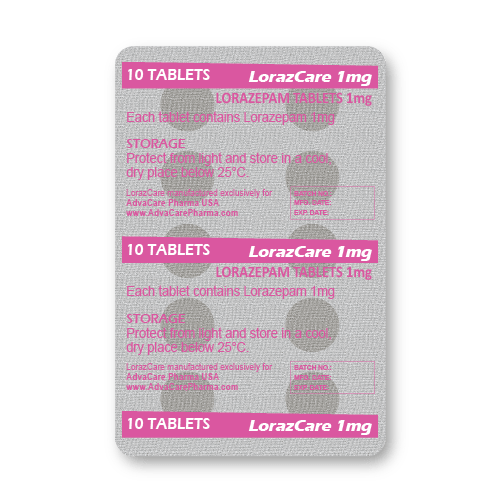- Home›
- Pharmaceuticals›
- Pharmaceutical Tablets›
- Lorazepam Tablets
Lorazepam Tablets
Dosage
Packaging
What is Lorazepam?
Active Ingredients: Lorazepam
Lorazepam Tablets are an anxiolytic drug used to relieve anxiety and sleeping problems that are associated with anxiety-related conditions, such as generalized anxiety disorder or panic disorder. This medication may also be used to calm anxious feelings before a medical or dental procedure.
Lorazepam is classified as a benzodiazepine and binds at receptors at several sites in the central nervous system (CNS). It slows down the CNS by enhancing the inhibitory effects of gamma-aminobutyric acid (GABA). This inhibitory action in the amygdala produces a calming effect that is beneficial in treating anxiety disorders. It is also used to treat seizure disorders due to its inhibitory activity in the cerebral cortex.
AdvaCare Pharma is a trusted global exporter of Lorazepam Tablets. This medication is produced in our facilities in China, India, and the USA. Our factories comply with WHO guidelines and standards, and we regularly inspect these facilities to ensure they meet these high standards.
Why are we a trusted Lorazepam manufacturer?
We are a Lorazepam manufacturer engaged in the global distribution of 200+ oral solid pharmaceutical products in tablet dosage form.
As an American-owned and operated company, we are devoted to the manufacture and supply of superior quality, yet cost-effective pharmaceuticals to improve access to healthcare solutions worldwide. AdvaCare Pharma manufactures Lorazepam Tablets, and over 500 other pharmaceutical treatments, according to strict GMP regulations as part of our global commitment to bring efficacious medicines to pharmaceutical distributors, hospitals, pharmacies and other medical institutions.
Uses
What is Lorazepam used for?
It is used for the short-term relief of insomnia and other symptoms related to anxiety disorders. It may also be used to calm anxious feelings and as a light sedate before a medical or dental treatment. Lorazepam can also be used to treat status epilepticus, which occurs when a seizure lasts over 5 minutes or multiple occur in 5 minutes without a regain of consciousness.
How should Lorazepam Tablets be used?
This medication is intended to be taken orally. Lorazepam Tablets can be taken with or without food.
What dose should be taken and for how long?
For the management of anxiety disorders in adults and children (≥ 12 years), the recommended initial dose is 2 to 3mg/day, taken in 2 or 3 divided doses a day. Dosage may be increased gradually to manage symptoms. The recommended maintenance dose is between 1 to 2mg, taken 2 to 3 times a day. When increasing dosing, bedtime doses should be increased first.
For the management of anxiety-related insomnia in adults and children (≥ 12 years), the recommended dose is 2 to 4mg once a day at bedtime. Dosage may be increased gradually to manage symptoms.
Long-term (> 4 months) safety and efficacy of lorazepam use have not been assessed clinically. Its clinical usefulness should be periodically reassessed by the prescriber.
When discontinuing lorazepam, dosages should be decreased gradually with guidance from a provider to reduce the risk of withdrawal reactions.
The dosage is based on medical condition, response to treatment, age, and weight. Refer to a doctor or pharmacist for guidelines on dosage. Do not exceed the advisable dosage.
Who can use Lorazepam?
Lorazepam can be administered to adults and children (≥ 12 years), but caution is advised for specific groups of patients.
Pregnant Animal studies have shown evidence of increased fetal malformations, resorption, and loss associated with lorazepam administration. Case reports of human pregnancies show an increased risk of cleft palate and cleft lip with benzodiazepine use during the first trimester. Third trimester use of benzodiazepines are associated with an increased risk of neonatal withdrawal symptoms, such as respiratory depression, hypotonia, apnea, feeding problems, and hypothermia.
Lorazepam use during pregnancy is not recommended and is often not medically necessary. It should only be used if the potential benefit outweighs the fetal risk.
Nursing Lorazepam is excreted in human milk in small amounts. Studies have not reported adverse infant reactions at standard maternal doses of lorazepam. Sedation and inability to suckle have been reported with the use of other benzodiazepines.
Lorazepam is considered safer for use while nursing than other benzodiazepines but should not be used while nursing unless the potential benefit outweighs the risk to the nursing infant.
Pediatric In pediatric patients < 12 years old, the safety and efficacy of lorazepam have not been established.
Paradoxical reactions are occasionally reported with benzodiazepine use and are more likely to occur in pediatric patients.
Geriatric Clinical studies with adults ≥ 65 years old were insufficient to determine whether they respond differently than adults < 65 years old. Incidences of sedation and unsteadiness increased in relation to patient age.
Lorazepam is a potentially inappropriate medication for geriatric patients due to the increased risk of cognitive impairment, falls, and fractures from age-related increases in medication sensitivity and decreases in clearance. Lorazepam use may be reasonable for treating severe generalized anxiety disorder, seizure disorders, alcohol withdrawal, and procedural sedation. Age-related impairments in hepatic and renal clearance should be considered and dose reduction may be necessary.
Other warnings
In patients with hepatic insufficiency, dosage reduction may be necessary, and lorazepam should be administered with caution.
In patients with renal insufficiency, dosage reduction may be necessary, especially in cases of frequent dose administration over short periods of time. If deemed medically necessary, lorazepam is a reasonable choice for patients with end-stage renal disease.
Concomitant use of benzodiazepines and CNS depressants (opioids, alcohol) are contraindicated due to the risk of potentially fatal sedation, respiratory depression, and coma. Opioid and benzodiazepine use are associated with a higher risk of drug-related mortality compared to opioid use alone. If lorazepam and opioid use are both deemed medically necessary, the lowest effective dose of the newest medication should be prescribed, and doses can be titrated based on clinical responses. Patients should be advised to not drive or operate heavy machinery until the effects of concomitant use have been determined.
Like with other benzodiazepines, there is a risk of lorazepam misuse and addiction. Misuse of benzodiazepines often involves the use of doses exceeding the maximum recommended dosage and the concomitant use of other medications, alcohol, and/or illicit substances. Benzodiazepine misuse is associated with an increased frequency of serious adverse outcomes, including respiratory depression, overdose, and death.
Except when treating alcohol withdrawal, lorazepam is contraindicated in those with active alcohol use disorder due to the increased risk of fatality when combined with lorazepam. Patients at risk for lorazepam misuse should be thoroughly assessed before and during treatment and initiated on the lowest effective doses.
Continued use of benzodiazepines at higher doses may lead to clinically significant physical dependence. Sudden discontinuation, rapid dosage reduction, or administration of a benzodiazepine antagonist, like flumazenil, may result in acute withdrawal reactions, some of which can be life-threatening (e.g., seizures). Some users develop protracted withdrawal syndrome that can last weeks or months after discontinuation. To reduce the risk of withdrawal reactions, lorazepam doses should be reduced and discontinued with a gradual taper.
Lorazepam overdose carries a risk of CNS and respiratory depression, which can result in hypotension, ataxia, muscle weakness, confusion, coma, and death. Extreme caution is recommended when administering to patients with respiratory insufficiencies (COPD, sleep apnea). Flumazenil can be used to treat benzodiazepine toxicity, as it competes with benzodiazepines when binding. Flumazenil has minimal benefit against the respiratory depression caused by benzodiazepine overdose, and ventilatory support may be necessary. Special caution should be taken when administering flumazenil to patients on prolonged benzodiazepine therapy, as the sudden interruption of the effects of benzodiazepines can result in the rapid onset of withdrawal symptoms, including seizures.
Benzodiazepine use may worsen or precipitate pre-existing depression. Lorazepam is not indicated or recommended for the treatment of primary depressive disorder or psychosis. Benzodiazepines should not be administered to patients with inadequately treated depression.
Side Effects
As with all pharmaceuticals, some unwanted effects can occur from the use of Lorazepam Tablets.
Common side effects include, but may not be limited to:
- drowsiness
- dizziness
- weakness
- confusion
- depression
- fatigue
- headache
- restlessness
- lack of coordination
Serious side effects that may require medical attention may include:
- difficulty breathing
- fainting
- withdrawal symptoms (seizures, insomnia, tingling and numbness)
- sudden or severe changes in mood or behavior
- hallucinations
- difficulty walking
- fever
- severe skin rash
- jaundice
- irregular heartbeat
For a comprehensive understanding of all potential side effects, consult a medical professional.
If any symptoms persist or worsen, or you notice any other symptoms, please call your doctor immediately.
Precautions
Do NOT use Lorazepam Tablets if:
- You are allergic to any of the ingredients.
- You are taking other benzodiazepines.
- You have a breathing disorder.
- You have acute narrow-angle glaucoma.
- You are pregnant or breastfeeding.
- You have an addiction or abuse problem.
Before treatment, consult your doctor regarding any medications you are taking to address potential drug interactions.
This medication may not be suitable for people with certain conditions, so it is important to consult with a doctor if you have any health conditions.
Avoid alcohol while taking this medication.
References
Lorazepam: A Controlled Trial in Patients with Intractable Partial Complex Seizures
In a double-blind, placebo-controlled, crossover trial, lorazepam was investigated in 8 patients experiencing frequent partial complex seizures unresponsive to standard anticonvulsant therapy.
During the study, concurrent antiepileptic drugs were maintained at therapeutic levels, with lorazepam concentrations closely monitored. Following an 8-week baseline period, patients were randomly assigned to receive either placebo or lorazepam (1mg twice daily). The dosage was gradually increased every two weeks until either seizure cessation or the emergence of intolerable side effects. After eight weeks, patients underwent crossover, and the same dose escalation approach was applied. Comparing seizure frequency during the final 2 weeks of each treatment phase revealed that seven out of eight patients experienced a reduction in seizures while on lorazepam, with the eighth patient reporting decreased seizure duration (statistically significant difference: p < 0.01, two-tailed sign test). Blood level analyses indicated a narrow therapeutic range, with seizure improvement observed at concentrations of 20–30ng/ml and adverse effects occurring at levels exceeding 33ng/ml.
The conclusion is that lorazepam is a valuable adjunct in managing refractory partial complex seizures.
You might be interested in...
Why AdvaCare Pharma?
As an industry leader, we are aware of our responsibility to provide affordable and sustainable solutions to improve healthcare worldwide.











